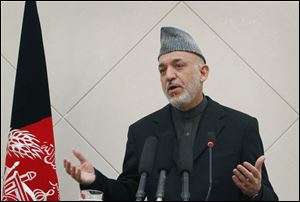
Talks over long-term role for U.S. in Afghanistan stall
Disputes on detainees, raids throw deal into question
3/6/2012
Hamid Karzai, Afghanistan’s president, has said that only Afghans should conduct night raids because the invasion of privacy of Afghans’ homes is compounded when the soldiers are Westerners.
KABUL, Afghanistan — Negotiations over a long-term U.S. military presence in Afghanistan have bogged down over issues of detainees, night raids, and quarrels within the Afghan president’s inner circle, throwing the whole deal into question.
The deal would formalize a U.S. role after NATO’s planned pullout in 2014.
The deadlock reflects growing hostility on the part of the Afghan leadership and increasing exasperation in Washington.
Trust has eroded in recent days with anti-American protests over Qur’an burnings at a U.S. base, a rising number of U.S. military personnel gunned down by Afghan security forces, and election-year demands to bring the troops home.
Afghan President Hamid Karzai met Monday evening with U.S. Ambassador Ryan Crocker, but a Karzai spokesman did not return phone calls requesting details about their talks.
Mr. Karzai has scheduled a news conference on Tuesday; it is unclear whether he will discuss the negotiations.
U.S. Embassy spokesman Gavin Sundwall would not disclose any information about the meeting.
Mr. Sundwall said earlier that despite the dragging talks, the U.S. was committed to a strategic partnership with the Afghan people. However, he said it was more important to get the right agreement than to get one.
The pact is expected to provide for several thousand U.S. personnel to stay and train Afghan forces and help with counterterrorism operations. It aims to outline the legal status of those forces, their operating rules, and where they will be based.
The pact, which was supposed to be finished before the next NATO summit in May in Chicago, is viewed as a means of assuring the Afghan people that the United States does not plan to abandon the country, even as it withdraws its combat forces.
NATO’s nighttime raids targeting insurgents are an especially touchy matter.
As part of the agreement, Mr. Karzai has said that Afghans should be the ones to conduct the night raids because the invasion of privacy by troops entering a family’s home is compounded when the soldiers are Westerners. He has complained that too many raids have resulted in the detention of noninsurgents or civilian deaths.
NATO argues that no shots are fired in more than 85 percent of the raids.
An even thornier issue is detentions. Mr. Karzai is demanding that the United States transfer control of its main prison in the country — the Parwan Detention Facility, which adjoins Bagram Air Field in eastern Afghanistan — to Afghan control.
Mr. Karzai said that having the United States run the prisons in his country is an affront to Afghan sovereignty.
First he demanded that the prison be handed over by early February, then extended the deadline to Friday.
The Obama Administration has said that the Afghan judicial system is not yet capable of taking over responsibility for dangerous battlefield detainees.
Mr. Sundwall said the United States is willing to work with the Karzai government.